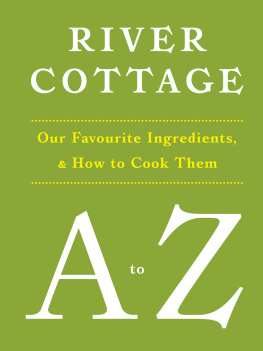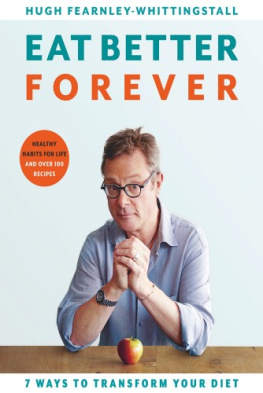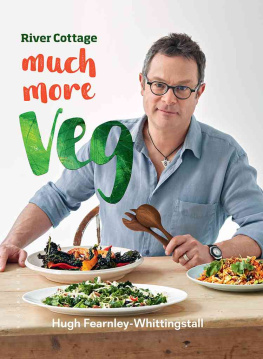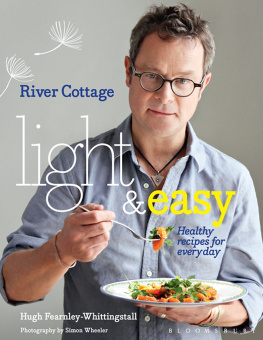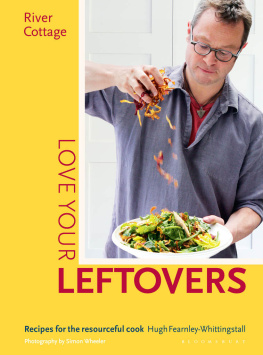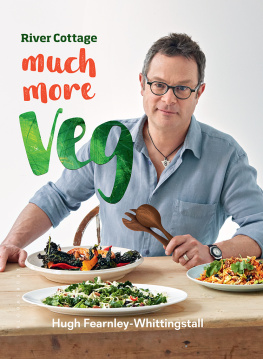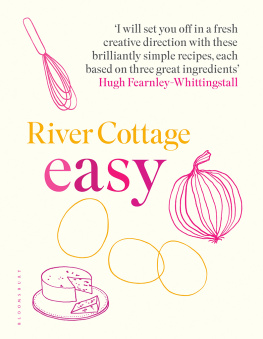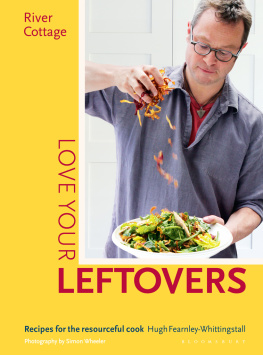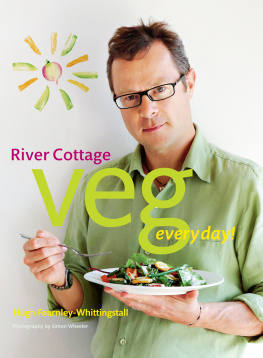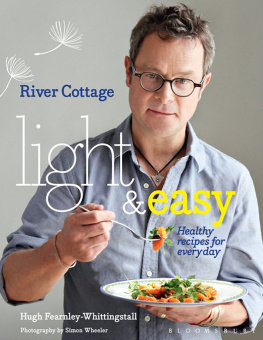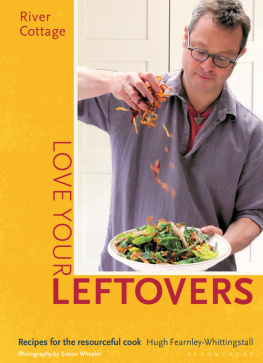
Introduction by
HUGH FEARNLEY-WHITTINGSTALL
Essays and recipes by
PAM CORBIN
MARK DIACONO
NIKKI DUFFY
HUGH FEARNLEY-WHITTINGSTALL
NICK FISHER
STEVEN LAMB
TIM MADDAMS
GILL MELLER
JOHN WRIGHT
Photography by
SIMON WHEELER
Illustrations by
MICHAEL FRITH

Introduction
The River Cottage story began almost exactly twenty years ago when I rented a tiny lock-keepers cottage near Netherbury in Dorset. Surrounded by woodland, the murmuring of the River Brit audible from the very basic kitchen, my plan was to use it as a weekend bolt-hole from London. But River Cottage soon got under my skin, and weekends started stretching into weeks as I found it ever harder to return to the city. I started putting down roots principally those of my favourite edible plants.
In such an idyllic and unspoiled spot, my long-standing interest in wild foods couldnt help but burgeon. And of course I began to raise my own home-grown ingredients both animal and vegetable. When you can catch your own fish at the bottom of the garden, pausing on the way back to the house to pick some herbs and vegetables to cook it with, you begin to look at the world with a new clarity.
River Cottage inspired me to seek out a more sustainable way of eating a way that was better for me, my young family, the local economy and the global environment. The River Cottage television series, which began in 1997, chronicled my trials and many errors as I foraged, fished, farmed and fumbled my way towards greater self-sufficiency. Meanwhile, I spent much of my time thinking about those ingredients that I had, like most of us, once bought shrink-wrapped and scrubbed to within an inch of their lives from the supermarket. I determined, from thereon in, that the ingredients I cooked with, and fed my family with, would be the best they could possibly be.
My experiences at River Cottage seemed to hit a nerve with a legion of viewers who shared my worries about the uglier realities of industrial food production and craved a more direct, honest and fulfilling relationship with their ingredients. During those early years I was lucky to encounter many kindred spirits, and I even managed to persuade a handful of them to join forces with me, becoming part of the team that would eventually create this book though none of us realised that at the time.
I met the naturalist John Wright, who has since taught me more about wild food than Id have ever thought possible. I also started my collaboration with Nick Fisher whose knowledge of and passion for fishing is incomparable. That partnership led to The River Cottage Fish Book still one of the books of which Im most proud.
I set up the first River Cottage HQ in a set of recently vacated dairy barns near Bridport. Very recently in fact I watched the cows walk out for the last time, then set to work scraping decades of their friendly deposits from the base of the walls and the corners of the yard. This rich matter became the first fertiliser for the veg beds that sprang up around the buildings.
As the fledgling business found its feet, I met a brilliant young local chef named Gill Meller. We bonded over the battered second-hand Falcon stove which occupied the dairy-turned-kitchen. Gill instantly became my culinary right-hand man, indispensible to the entire River Cottage operation.
In 2006, River Cottage HQ leapt across the county boundary to its current, long-term home in East Devon. Park Farm, comprising sixty acres of rolling farmland in a valley near Axminster, became the site of our cookery school, kitchen garden and smallholding. We began hosting regular dinners and teaching courses: A Pig in a Day, Catch and Cook and Build and Bake set the tone. Steven Lamb, another early addition to the team, soon became an absolute lynchpin in pulling together these events. Today, as our principal host, and resident expert on smoking and curing, his knowledge of all things River Cottage is truly encyclopaedic.
Meanwhile, the indefatigable Mark Diacono came on board to lead our garden team while simultaneously running his own ground-breaking climate change garden project down the road at Otter Farm. Local entrepreneur Pam the Jam Corbin was recruited to share her considerable wisdom, and her pickling and preserving days became some of our most popular courses. I also invited the hugely talented food writer Nikki Duffy to work with me on a broad portfolio of projects and, along with Gill, she has been my collaborator in devising recipes ever since. And after Tim Maddams joined us as head chef at the very first River Cottage Canteen in Axminster, he also became a valued culinary sounding board and fishing companion.
During the fifteen years since The River Cottage Cookbook came out, my co-authors and I have published a veritable library of books twenty-eight, at last count. These have included The River Cottage Meat Book, River Cottage Veg Every Day and a whole panoply of handbooks which encompass everything from foraging to fishing, herbs to home-curing. We are nothing if not prolific. So you might be forgiven for wondering why we have chosen to bring another hefty tome into the world?
The truth is, a River Cottage bible focusing on ingredients is something thats been in my mind for a very long time. After all, if you remove ingredients from the equation there would be no River Cottage at all. Its the same for all cooks, domestic or professional: every culinary endeavour starts with ingredients and the best start with the best. This volume, I hope, will help you gain familiarity with, and confidence in, the finest raw materials. I believe there is no better recipe for successful cooking.
As with all the best reference books, I knew that such a volume needed to be the work of more than one person certainly more than just me. Topics this broad demand a range of knowledge and experience a stellar team of experts. Happily, I knew exactly where to find them.
Not only are my co-writers among the most knowledgeable people you could ever meet in their fields of expertise, they are qualified in the most important sense of all they are avid cooks and enthusiastic eaters. We are all on the same page or, you might say, the same plate. At the end of the day, there is nothing we enjoy more than sitting down and tucking into something simply delicious but we want to do so with peace of mind and a clear conscience. Finding, sourcing or growing the best food possible is a shared ambition even an obsession, you might say. We get excited about producers who are doing things really well, just as we become angry about the (all too many) things that are wrong with the world of food.
And we all recognise how essential good ingredients are in our lives. They are more than the tools of the cooks trade, more even than the basis of the daily meals we all consume. Ingredients are, quite literally, us. They physically become part of our bodies, and the bodies of those for whom we cook. The food we choose is the very matter that underpins our life, our health and our well-being. What could possibly be more fundamental than that?
It is the cooks role, and pleasure, to take these life-giving materials and make them life-affirming too. Ingredients are our sensory palette the box of tricks from which we select the flavours and textures we most desire, in order to produce meals that will not just sate hunger, but will delight, comfort, refresh and excite. Once you know your way around ingredients, you have a wondrous power at your disposal: the power to express care, passion or love through a plate of food. Thats pretty amazing.
Next page
